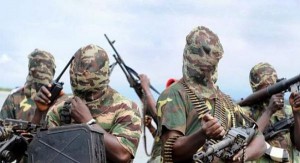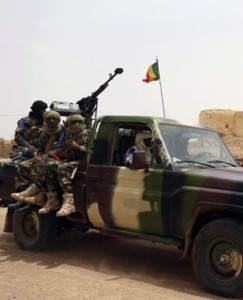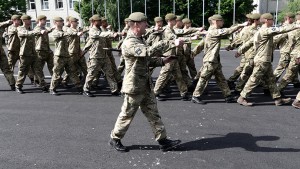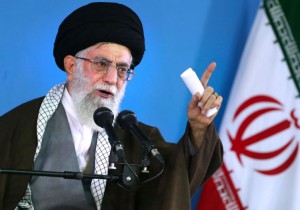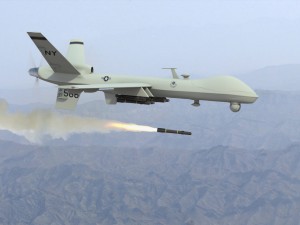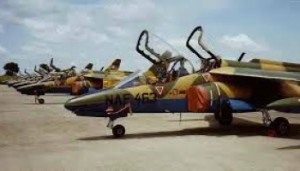In recent clashes among the members of Taliban and Daesh groups in Nangarhar province, 17 of them killed.
The Clashes took place in Lalpoor and DorBaba districts of Nangarhar province while Daesh group attacked on Taliban.
A border police commander in the east told BNA, that in the clashes 17 members of the both Taliban and Daesh militants lost their lives.
He said, clashes took place while Daesh militants attacked on armed men belongs to Taliban.
According to the reports, members of these two groups attempted to set fire the houses of each other.
Nigeria, 178 rescued from Boko Haram camps
Nigerian troops have rescued 178 people from Boko Haram in attacks that destroyed several of the Islamic extremist group’s camps in the north east, according to the army.
Army spokesman Colonel Tukur Gusau said 101 of those freed were children, along with 67 women and 10 men.
The Nigerian Air Force reported killing “a large number” of militants in repelling an attack on Bitta village, 30 miles south west of the army operations that took place around Bama, 45 miles south east of Maiduguri city.
Maiduguri is the birthplace of Boko Haram and the capital of north-eastern Borno state.
Last week the army rescued 71 kidnapped people, some of whom said they had been held by Boko Haram for up to a year in villages just 25 miles from Maiduguri.
Hundreds have been freed from Boko Haram captivity this year but none of the 219 girls abducted in April 2014 from a school in Chibok was among the rescued.
Meanwhile the extremists distributed a new video on Twitter purporting to show attacks on Nigerian army barracks in the states of Borno and Yobe. The video also shows the beheading of a man in military fatigues said to be a Nigerian soldier.
According to a translation by the SITE Intelligence Group, an unidentified fighter, shown in the video with looted army weapons and ammunition, says the footage shows Nigeria’s military has not forced Boko Haram from its positions and got them hemmed into the Sambisa Forest, as the military has claimed.
2 soldiers killed, 5 injured in ambush on Malian convoy
Two Malian soldiers were killed and five were injured on Sunday when their convoy was ambushed in the centre of the country, a defence official said.
The attack occurred on the road between the central towns of Nampala and Diabaly, roughly 400 kilometres by road north of the capital, Bamako, said Lt. Col. Diarran Diakite, a defence ministry adviser.
“At this time we can’t say anything about the identity of those behind this ambush, but it’s clear that they are against the peace process,” Diakite said.
Mali’s northern half fell under the control of Islamic extremists following a military coup in 2012. A French-led military intervention in 2013 scattered the extremists from the north’s cities and towns, though the region remains insecure despite the presence of U.N. peacekeepers.
In recent months, violence has extended south. In March, a masked gunman opened fire at a restaurant popular with foreigners in Bamako, killing five people.
In late June, gunmen killed three soldiers in an attack on a village near the border with Mauritania, then followed that up the next day by briefly occupying a village near the border with Ivory Coast. The Ansar Dine extremist group later said it was behind those attacks.
Mali’s government signed a peace deal with Tuareg separatist rebels earlier this year.
West planning new intervention in Libya
A group of Western nations are planning to send ground troops into Libya to train local authorities and launch attacks against a branch of the Islamic State group, military sources have told The Times of London.
The UK, US, Italy, France, Spain, and Germany will work with the UN and the EU to “rebuild organs of the state and train security forces” according to the report in The Times.
The operation will not be launched until a Government of National Accord is agreed upon. The UN brokered agreement for a unity government has not been initialed by one of the two warring parties, the Tripoli-based GNC government. While the internationally-recognized government the House of Representatives(HoR) in Tobruk has initialled the agreement both the HoR government’s army commander-in-chief Khalifa Haftatr and the chief of the air force have rejected the deal. Libya Dawn, the forces associated with the Tripoli government, also rejects the deal. It is not clear when any unity government will be formed. The military sources told The TImes that the unity government will be put in place imminently. I do not see how that is possible given that the GNC has not yet signed on to any agreement and neither of the two main conflicting military forces accept the agreement.
The UN special envoy to Libya, Bernardino Leon, who brokered the deal met with representatives of the GNC government on Thursday night and Friday in Algiers, to discuss ways to move the dialogue process forward. The GNC rejected the draft that the others signed. The GNC reacted favourably to the fourth draft but when they met to consider it, they found what was in effect a fifth draft in which the fourth draft was modified to remove any power of the GNC to influence or block legislation from the Tobruk House of Representatives(HoR), which is the sole legislative body in the new unity government. These changes were made without being discussed with or approved by the GNC. This resulted in the GNC representatives leaving the dialogue and refusing to initial the agreement. The GNC has demanded that amendments which they have proposed be discussed and changes made to the agreement. So far Leon appears to take the position that the agreement cannot be amended since the other parties have initialled it.
The Times military source said that air strikes would be necessary in the intervention:“You might see movement towards the end of August. Things will then start to move very quickly.” Special forces from the UK, France, US, and Italy will launch operations against the Islamic State. The Islamic State is mostly in control of Sirte and an area around it. In other areas it launches guerilla type actions. It does however have a presence in Benghazi and in the mountains outside of Sirte. The western action could very well turn out to be a continuation of Haftar’s Operation Dignity that is fighting not just the Islamic State but all the Islamists allied with the Tripoli government. What you would have is the west intervening on one side in a civil war. Ironically, it would be supporting a government that has bombed its own people as Gadaffi did and has acted to undermine the peace process while demanding more support for itself from the international community. Perhaps Haftar could be sidelined as he is already being sanctioned by the EU for rejecting the Leon-brokered deal. However, he may not step aside willingly and most of the armed forces are loyal to him rather than the Tobruk government. Sources from the EU and Libya call these actions a “stabilisation” mission a very Orwellian description given the circumstances.
Another report, notes that UK troops are set to be deployed to Libya. The participants in the mission are known as the P3 + 5. The group will seek a UN resolution to authorise their intervention in Libya. While special forces units will carry out counter-terrorism operations the US and France will carry out air strikes. The intervention will probably turn Libya into a disaster area if it goes ahead. Even if there is a unity government formed, that government could very well resist any foreign troops on the ground in Libya. Both the Tobruk government and the Tripoli government object to an EU mission to counter human trafficking into Europe from Libya.
Russian forces kill 8 Islamic State members in North Caucasus
Russia’s counterterrorism agency says its forces in North Caucasus have killed eight militants who had sworn allegiance to the Islamic State group.
The Anti-Terrorist Committee said Sunday that the militants killed in combat in the province of Ingushetia west of Chechnya were involved in a series of attacks on police. It added that they had recently swore an oath of allegiance to IS.
The agency said those killed included the group’s leader, Adam Tagilov, who was accused of staging December’s attack in Chechnya’s provincial capital, Grozny, which left 25 people dead. The raid dented the carefully nurtured image of stability under Chechnya’s strongman.
Russian officials said more than 1,000 Russian nationals have joined the Islamic State group and voiced fears they could pose a major threat when they return.
Ayatollah publishes book calling to wipe out Israel, give Iran full reign in the Middle East
The supreme leader of Iran is apparently now an aspiring author but one thing is for sure: this is no love story.
According to a report on Saturday in the New York Post, Ayatollah Ali Khamenei’s new book Palestine outlines his case for why Israel must be wiped out and how. “The solution is a one-state formula,” he writes, which is called “Palestine.”
He said this “practical and logical mechanism” would have Israel under Muslim rule with some Jews being allowed to stay as a “protected minority” but only after proving “genuine roots.” He advocates strict apartheid against Jews saying that they would not be allowed to vote in a future Muslim state while Arabs would have full rights.
He claims that his plan would promote “the hegemony of Iran” while removing “the West’s hegemony” from the Middle East.
Khamenei, who is described in the book as “the flagbearer of Jihad to liberate Jerusalem,” wrote that his views are not anti-Semitic but Islamic and based on “well-established Islamic principles.” This goes on the opinion in Islam that land which was once owned by Muslims can never be ruled by non-Muslims again. Along with Israel, this also includes Russia, many parts of Europe, Thailand, India and parts of China and the Philippines.
However, Khamenei singles Israel out as an adou [enemy], doshman [foe] and a “cancerous tumor” for several reasons, the first of which is for being an “ally of the American Great Satan” which is waged in a war to overtake “the heartland of the Ummah [nation].”
Second, he says Israel is singled out because of his claim that it has waged a war on Muslims and therefore has become a kaffir al-harbi [hostile infidel].
Third, he claims that Israel “occupies” Jerusalem and calls it “Islam’s third Holy City.”
Khamenei says his plan entails low-intensity warfare based on wearing down the patience of Israelis and the international community. He writes that this plan does not entail “classical warfare” and he supposedly does not want to kill Jews.
His plan goes on the assumption that all Israelis have dual citizenship and would rather live in the US or Europe. He recommends therefore to make life in Israel so uncomfortable that they leave voluntarily to avoid threats on them.
He then describes using the tactic of “Israel fatigue” wherein the international community would decide to stop supporting Israel’s military programs.
Another section of the book boasted past Iran-supported warfare against Israel using examples from Gaza and Lebanon. He writes that he aims to recruit West Bank “fighters” in units modeled after Hezbollah.
“We have intervened in anti-Israel matters, and it brought victory in the 33-day war by Hezbollah against Israel in 2006 and in the 22-day war between Hamas and Israel in the Gaza Strip.”
Though he doesn’t reference an Iranian nuclear program directly, he mentions that a nuclear Iran would be able to deter Israel from taking any military action against the Islamic republic.
Referring to the Holocaust, Khamenei called it a “propaganda ploy” and writes that “we don’t know why it happened and how.”
The 416-page book is currently only available in Iran in Persian, but apparently an Arabic version is on the way.
Yemen pro-government fighters receive new weapons
Pro-government fighters in Yemen have received weapons shipments in the war-torn city of Aden, as Shiite rebels scramble to deploy reinforcements, military officials from both sides of the conflict said Sunday.
Military and port officials in Aden said new heavy and medium weapons and ammunition arrived in Aden in late July by sea to support pro-government army divisions and militias against the Shiite Houthi rebels and allied military units.
The officials said tanks, artillery, missiles and armored vehicles were included in the shipment from Saudi Arabia and the United Arab Emirates, which have been waging a U.S.-backed air campaign against the Iran-supported rebels since March.
After months of fierce fighting, pro-government fighters have recently pushed rebels out of Aden and advanced in Taiz, Yemen’s third-largest city.
Military officials close to the Houthis in the rebel-held capital Sanaa said the rebels are continuously sending military reinforcements south to Aden and Taiz, suggesting major losses.
They said the Houthis are determined to continue fighting in Aden and Taiz, and have demanded that allied tribes send fighters to the two fronts. The Houthis are also actively recruiting new fighters in mosques, the officials said.
All officials spoke on condition of anonymity because they were not authorized to speak to journalists.
The fighting in Yemen pits the Houthis and troops loyal to former President Ali Abdullah Saleh against southern separatists, local and tribal militias, Sunni Islamic militants and loyalists of exiled President Abed Rabbo Mansour Hadi, who is now in Saudi Arabia.
Saudi Arabia said one of its citizens was killed Sunday when a house inside the kingdom was struck by fire from neighboring Yemen.
A civil defense spokesman, Ali bin Omair al-Shahrani, said in comments to the official Saudi Press Agency that the Saudi was killed in the border town of Najran.
Afghanistan: drone strike kills senior Taliban commander in Logar
Drone strike has killed a senior Taliban commander in Logar province, an official said on Sunday.
Mawlawi Habib Rahman, head of Taliban’s military commission in Baraki Barak District was reportedly targeted the air strike last night.
Mohammad Rahim Amin, governor of Baraki Barak District said that three comrades of Mawlawi Rahman were also killed the air strike carried out in Cholzi area.
The district governor further said that Mawlawi Rahman was doing destructive activities in Baraki Barak for the past few years.
“After the killing of Mawlawi Habib Rahman, the security in this district will get better.” He said.
Taliban had no commented on the report by the time this report was filed.
Boko Haram loses fighters as Air Force, Army repel attack on Bita village
The Nigerian Air Force, NAF, in a combined effort with the ground troops of the Nigerian Army, have successfully repelled an attack on Bita Village by Boko Haram insurgents.
The Nigerian Air Force, using its Alpha-Jet, provided combat air support to the ground force to attack the insurgents where they were observed to be mopping up to carry out a deadly attack on the village.
Director of Information, Nigerian Air Force, Air Commodore Dele Alonge, in a statement, said many Boko Haram fighters were killed and several others were injured.
Thereafter, the NAF A-Jet conducted an armed reconnaissance along Bita-Gwoza road and through Yamtege, Hamdaga, Dure and Pulka.
The statement assured that NAF will continue to give all necessary support to the ground force through its intensified and persistent efforts in the ongoing fight against Boko Haram terrorists in the North-East until all portions of Nigerian soil is safe and free from the insurgents.
ISIS flexes muscles in eastern Libya
Five Libyan troops loyal to the internationally recognised government were killed Friday and another 18 are missing after an attack on an eastern checkpoint allegedly carried out by the Islamic State group (ISIS), a state news agency said.
A military source told the LANA agency, loyal to the recognised government, that “five soldiers were killed… and 18 other soldiers are missing in an attack carried out by the Libyan branch of the Islamic State group” on Friday.
He added that the attack was against a military checkpoint “located on the desert road between the two cities of Ajdabiya and Tobruk” in eastern Libya.
The place of the attack, according to the source, is just 170 kilometres (100 miles) from the headquarters of the recognised parliament in Tobruk.
Plunged into chaos after the 2011 overthrow and killing of dictator Moamer Gathafi, Libya has two parliaments and governments vying for power, as a slew of armed groups battle for control of its oil wealth.
Islamic State jihadists have taken advantage of Libya’s divisions to establish itself in the country, close to Europe’s shores.

